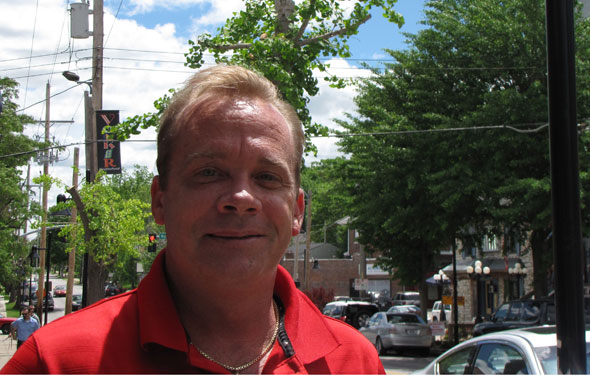
Arborist Paul Weaver stood in front of one of the Ginkgo trees recently chopped by Google Fiber workers. Weaver says the trees will most likely die and business owners say if they must be replaced, another species may be a better choice.
by Joe Lambe
Crews working for Google fiber killed a line of Ginkgo trees on 39thStreet when they recently topped the lush plants and left them looking like tall sticks, an arborist said Saturday.
Paul Weaver of Tree Doctor Inc., pronounced the impending deaths at a Saturday press conference with area business owners.
“When you do this to the tops it causes root die back,” he said.
So the business owners say the only solution is for Google to replace the trees, estimated to be at least two decades old.
One thing though – they do not want the replacement trees to be Ginkgos.
Granted the trees were tall, lush and attractive but they had a drawback. The business owners paid hundreds of dollars a year to inject them with chemicals to limit the stinking fruit they put out.
Cindy Larkin, owner of Twisted Sister, bluntly described the fallen fruit: “The smell, you can’t get rid of it. People get it on their shoes, they track it into stores and it has the smell of feces.”
Michael Valverde, owner of Mud Pie, said people call them pooberry trees because of the smell but “they were beautiful.”
Now, he said, “they kind of look like midwestern palm trees.”
Wikipedia describes the Ginkgo’s ancient Chinese origins, fine lines and unique leaves but offers less praise for the smell of its fruit: “like rancid butter or vomit,” caused by a chemical called butyric acid in the yellow-brown, fruit-like seeds.
Larkin said the trees also grow too tall, up into the power lines and Google fiber lines, so a different tree would be better for everyone.
Possibly a Littleleaf Linden, the tree doctor suggested.
Google issued a statement later saying it is working with the business owners and the city to resolve the Ginkgo problem.
Larkin said the whole matter could just be a learning lesson for Google that will prompt closer communication with neighborhoods in the future.
“They say they’re going to fix it,” she said. “I think they will.”
If so, the attractive but flawed Ginkgo trees will pass away with little mourning.
At the gathering Saturday, people couldn’t remember who was responsible for planting them in the first place or why.



Trackbacks